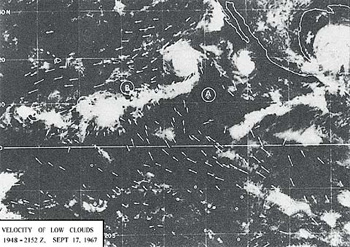The Evidence Initially, the Meccan unbelievers said Muhammad is the author of the Quran. God responded to them: “Or do they say, ‘He himself has composed this [message]’? No, but they are not willing to believe! But then, [if they deem it the work of a mere mortal,] let them produce another discourse like it - if what they say be true! [Or do they deny the existence of God implicitly by denying the fact of His revelation?] Have they themselves been created without anything - or were they, perchance, their own creators?” (Quran 52:33-35) First, God challenged them to produce ten chapters like the Quran: “Or they may say, ‘He forged it,’ Say, ‘Bring ye then ten suras forged, like unto it, and call (to your aid) whomsoever you can, other than God! - If you speak the truth!’ If then they answer not your (call), know you that this revelation is sent down with the knowledge of God, and that there is no god but He! Will you then submit (to Islam)?” (Quran 11:13-14) But, when they were unable to meet the challenge of ten chapters, God reduced it to a single chapter: “And if you are in doubt about what We have sent down on Our slave, then produce a surah thereof and call upon your witnesses other than God, if you should be truthful. But if you do not – and you will never be able to – then fear the Fire whose fuel is men and stones, prepared for the unbelievers.” (Quran 2:23-24) Finally, God foretold their eternal failure to meet the divine challenge: “Say: ‘If all mankind and all jinn would come together to produce the like of this Quran, they could not produce its like even though they were to exert all their strength in aiding one another!’” (Quran 17:88) The Prophet of Islam said: “Every Prophet was given ‘signs’ because of which people believed in him. Indeed, I have been given the Divine Revelation that God has revealed to me. So, I hope to have the most followers of all the prophets on the Day of Resurrection.” (Saheeh Al-Bukhari) The physical miracles performed by the prophets were time-specific, valid only for those who witnessed them, whereas the like of the continuing miracle of our Prophet, the Noble Quran, was not granted to any other prophet. Its linguistic superiority, style, clarity of message, strength of argument, quality of rhetoric, and the human inability to match even its shortest chapter till the end of time grant it an exquisite uniqueness. Those who witnessed the revelation and those who came after, all can drink from its fountain of wisdom. That is why the Prophet of Mercy hoped he will have the most followers of all the prophets, and prophesized that he would at a time when Muslims were few, but then they began to embrace Islam in floods. Thus, this prophecy came true. Explanation of Quran’s Inimitability |  Divine facilitation is proportionate to human need. God makes acquisition easier as the need of humans increase. Air, water, and sunlight are necessary for human survival, and thus God has granted their acquisition to all without hardship. The greatest human need is to know the Creator, and thus, God has made it easy to know Him. The evidence for God, however, differs in its nature. In its own way, everything in creation is evidence of its Creator. Some evidence is so obvious that any lay person can immediately ‘see’ the Creator, for instance, the cycle of life and death. Others ‘see’ the handiwork of the Creator in the elegance of mathematical theorems, universal constants of physics, and the development of the embryo:
Divine facilitation is proportionate to human need. God makes acquisition easier as the need of humans increase. Air, water, and sunlight are necessary for human survival, and thus God has granted their acquisition to all without hardship. The greatest human need is to know the Creator, and thus, God has made it easy to know Him. The evidence for God, however, differs in its nature. In its own way, everything in creation is evidence of its Creator. Some evidence is so obvious that any lay person can immediately ‘see’ the Creator, for instance, the cycle of life and death. Others ‘see’ the handiwork of the Creator in the elegance of mathematical theorems, universal constants of physics, and the development of the embryo: Many people misunderstand the Quran’s literary challenge to produce something like it. Many people assume it simply means writing something as “good” as the Quran.
Many people misunderstand the Quran’s literary challenge to produce something like it. Many people assume it simply means writing something as “good” as the Quran.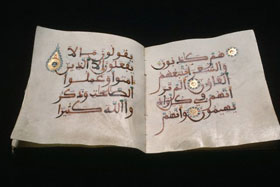 The Quran is not only unique in the way in which it presents its subject matter, but it is also unique in that it is a miracle itself. By the term “miracle,” we mean the performance of a supernatural or extraordinary event which cannot be duplicated by humans. It has been documented that Prophet Muhammad, may the mercy and blessings of God be upon him, challenged the Arabs to produce a literary work of a similar caliber as the Quran, but they were unable to do so in spite of their well-known eloquence and literary powers. The challenge to reproduce the Quran was presented to the Arabs and mankind in three stages:
The Quran is not only unique in the way in which it presents its subject matter, but it is also unique in that it is a miracle itself. By the term “miracle,” we mean the performance of a supernatural or extraordinary event which cannot be duplicated by humans. It has been documented that Prophet Muhammad, may the mercy and blessings of God be upon him, challenged the Arabs to produce a literary work of a similar caliber as the Quran, but they were unable to do so in spite of their well-known eloquence and literary powers. The challenge to reproduce the Quran was presented to the Arabs and mankind in three stages: There is another important aspect that Muslim scholars have traditionally considered the greatest miraculous aspect of the Quran, this is the linguistic miracle. Unfortunately, though, before becoming a Muslim (and even afterwards), I had no way to truly appreciate this topic. I could only read what some scholars had written about the language and beauty of the Quran. For example, John Naish wrote:
There is another important aspect that Muslim scholars have traditionally considered the greatest miraculous aspect of the Quran, this is the linguistic miracle. Unfortunately, though, before becoming a Muslim (and even afterwards), I had no way to truly appreciate this topic. I could only read what some scholars had written about the language and beauty of the Quran. For example, John Naish wrote: The “scientific miracles” of the Quran is a topic that many people are talking about nowadays, as the research in many fields continues. The source for this is probably the fact that there are literally hundreds of verses of the Quran in which God points to different aspe
The “scientific miracles” of the Quran is a topic that many people are talking about nowadays, as the research in many fields continues. The source for this is probably the fact that there are literally hundreds of verses of the Quran in which God points to different aspe The next aspect that caught me eye—and this again was something that non-Muslims were mentioning in their works—was the effect that the Quran had on the generation of the Prophet. May the mercy and blessings of God be upon him, and afterwards.
The next aspect that caught me eye—and this again was something that non-Muslims were mentioning in their works—was the effect that the Quran had on the generation of the Prophet. May the mercy and blessings of God be upon him, and afterwards.  I noticed almost immediately that the Quranic teachings are very comprehensive, complete, balanced and practical. For the sake of brevity, I will not go into this aspect in any detail but it was something that impressed me quite a bit. The range and flexibility of the laws of the Quran are impressive. It was clear to me that this book was not revealed just for a people at a specific time but was meant for people of very different times and places.
I noticed almost immediately that the Quranic teachings are very comprehensive, complete, balanced and practical. For the sake of brevity, I will not go into this aspect in any detail but it was something that impressed me quite a bit. The range and flexibility of the laws of the Quran are impressive. It was clear to me that this book was not revealed just for a people at a specific time but was meant for people of very different times and places. Furthermore, in the Talmud
Furthermore, in the Talmud I was very impressed with the Quran’s teachings about God and found it unlike any other scripture that I had studied. This was once again proving to me that this scripture was free of all human interpolation. I was also very impressed with the way that it handled belief about God in particular and its belief system as a whole.
I was very impressed with the Quran’s teachings about God and found it unlike any other scripture that I had studied. This was once again proving to me that this scripture was free of all human interpolation. I was also very impressed with the way that it handled belief about God in particular and its belief system as a whole. In my study of other religions, one of my goals was to read each religion’s sacred scriptures directly, in order to understand directly from the source what the religion was all about. This is obviously what piqued my curiosity in the Quran.
In my study of other religions, one of my goals was to read each religion’s sacred scriptures directly, in order to understand directly from the source what the religion was all about. This is obviously what piqued my curiosity in the Quran. Let me state at the outset that, after being Muslim for many years now, if I were given the topic of “The Miraculous Quran,” as I see it now, I would be emphasizing and discussing aspects that were completely unknown to me at the time that I was studying Islam as a non-Muslim. I have been studying the Quran for over thirty years now and it never fails to fascinate me. In fact, the phenomenon of continually finding new fascinating aspects of the Quran has been true for the Muslim scholars throughout the years. Over the centuries, as they have spoken about the Quran, later scholars recognize the miraculous aspects that the earlier scholars mentioned while coming across other aspects that they consider no less remarkable and amazing. Thus, for example, in the past century, we have had Aishah bint al-Shaati, Sayyid Qutb and Mustafa Saadiq al-Raafi’ee all adding components to the overall theory of the miraculous nature of the Quran.
Let me state at the outset that, after being Muslim for many years now, if I were given the topic of “The Miraculous Quran,” as I see it now, I would be emphasizing and discussing aspects that were completely unknown to me at the time that I was studying Islam as a non-Muslim. I have been studying the Quran for over thirty years now and it never fails to fascinate me. In fact, the phenomenon of continually finding new fascinating aspects of the Quran has been true for the Muslim scholars throughout the years. Over the centuries, as they have spoken about the Quran, later scholars recognize the miraculous aspects that the earlier scholars mentioned while coming across other aspects that they consider no less remarkable and amazing. Thus, for example, in the past century, we have had Aishah bint al-Shaati, Sayyid Qutb and Mustafa Saadiq al-Raafi’ee all adding components to the overall theory of the miraculous nature of the Quran.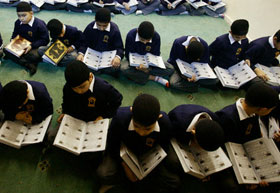 The Quran contains many prophecies that have been fulfilled, but in this discussion, we will limit ourselves to only five.
The Quran contains many prophecies that have been fulfilled, but in this discussion, we will limit ourselves to only five. Initially, the Meccan unbelievers said Muhammad is the author of the Quran. God responded to them:
Initially, the Meccan unbelievers said Muhammad is the author of the Quran. God responded to them: Who authored the Quran? Someone must have produced it! After all, how many desert men have stood up in the history of man and given the world a book like the Quran? The book has amazing details of past nations, prophets, and religions as well as accurate scientific information unavailable at the time. What was the source of all this? If we were to deny the divine origin of the Quran, we are left with only a few possibilities:
Who authored the Quran? Someone must have produced it! After all, how many desert men have stood up in the history of man and given the world a book like the Quran? The book has amazing details of past nations, prophets, and religions as well as accurate scientific information unavailable at the time. What was the source of all this? If we were to deny the divine origin of the Quran, we are left with only a few possibilities: Although it is proven that the text of the Quran has remained intact till today, how are we sure that the words actually originated from God and not some other source? This takes us to look at the authenticity, authority, or source of the Quran.
Although it is proven that the text of the Quran has remained intact till today, how are we sure that the words actually originated from God and not some other source? This takes us to look at the authenticity, authority, or source of the Quran. Some claim that the Quran was the work of the devil.
Some claim that the Quran was the work of the devil.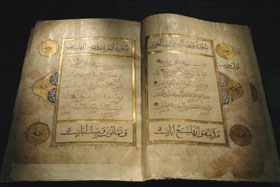 The Glorious Quran, the Muslims’ religious Scripture, was revealed in Arabic to the Prophet Muhammad, may the mercy and blessings of God be upon him, through the angel Gabriel. The revelation occurred piecemeal, over a period of twenty-three years, sometimes in brief verses and sometimes in longer chapters.
The Glorious Quran, the Muslims’ religious Scripture, was revealed in Arabic to the Prophet Muhammad, may the mercy and blessings of God be upon him, through the angel Gabriel. The revelation occurred piecemeal, over a period of twenty-three years, sometimes in brief verses and sometimes in longer chapters. The reality of Paradise is something which people will never be able to understand until they actually enter it, but God has shown us glimpses of it in the Quran. He has described it as a place essentially different to the life of this world, both in the very nature and purpose of life, as well as the types of delights which people will enjoy therein. The Quran tells people about Paradise, which God offers to them, describes its great blessings, and proclaims its beauties to everyone. It informs people that Paradise is one of two ways of life prepared for them in the afterworld, and that every good thing will be theirs in Paradise to a degree that surpasses our present ability to imagine. It also shows that Paradise is a place where all blessings have been created perfectly and where people will be offered everything their souls and hearts will desire, and that people will be far removed from want and need, anxiety or sadness, sorrow and regret. Every kind of beauty and blessing exists in Paradise and will be revealed with a perfection never seen or known before. God has prepared such blessings there as a gift, and these will be offered only to people with whom He is pleased.
The reality of Paradise is something which people will never be able to understand until they actually enter it, but God has shown us glimpses of it in the Quran. He has described it as a place essentially different to the life of this world, both in the very nature and purpose of life, as well as the types of delights which people will enjoy therein. The Quran tells people about Paradise, which God offers to them, describes its great blessings, and proclaims its beauties to everyone. It informs people that Paradise is one of two ways of life prepared for them in the afterworld, and that every good thing will be theirs in Paradise to a degree that surpasses our present ability to imagine. It also shows that Paradise is a place where all blessings have been created perfectly and where people will be offered everything their souls and hearts will desire, and that people will be far removed from want and need, anxiety or sadness, sorrow and regret. Every kind of beauty and blessing exists in Paradise and will be revealed with a perfection never seen or known before. God has prepared such blessings there as a gift, and these will be offered only to people with whom He is pleased. The Bible is the sacred scripture of Judaism and Christianity. The Christian Bible consists of the Old Testament and the New Testament, with the Roman Catholic and Eastern Orthodox versions of the Old Testament being slightly larger because of their acceptance of certain books not accepted as scripture by Protestants. The Jewish Bible includes only the books known to Christians as the Old Testament. Furthermore, the arrangements of the Jewish and Christian canons differ considerably.
The Bible is the sacred scripture of Judaism and Christianity. The Christian Bible consists of the Old Testament and the New Testament, with the Roman Catholic and Eastern Orthodox versions of the Old Testament being slightly larger because of their acceptance of certain books not accepted as scripture by Protestants. The Jewish Bible includes only the books known to Christians as the Old Testament. Furthermore, the arrangements of the Jewish and Christian canons differ considerably.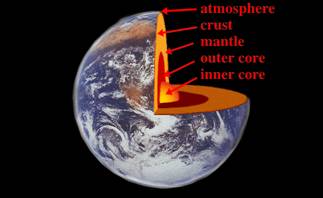
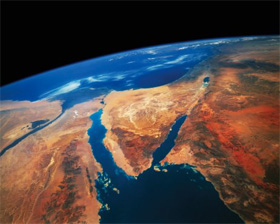 In the early 7th century, the two most powerful empires at the time were the Byzantine
In the early 7th century, the two most powerful empires at the time were the Byzantine
 Iron is one of the elements highlighted in the Quran. In the chapter known Al-Hadeed, meaning Iron, we are informed:
Iron is one of the elements highlighted in the Quran. In the chapter known Al-Hadeed, meaning Iron, we are informed: Scientists have studied cloud types and have realized that rain clouds are formed and shaped according to definite systems and certain steps connected with certain types of wind and clouds.
Scientists have studied cloud types and have realized that rain clouds are formed and shaped according to definite systems and certain steps connected with certain types of wind and clouds.